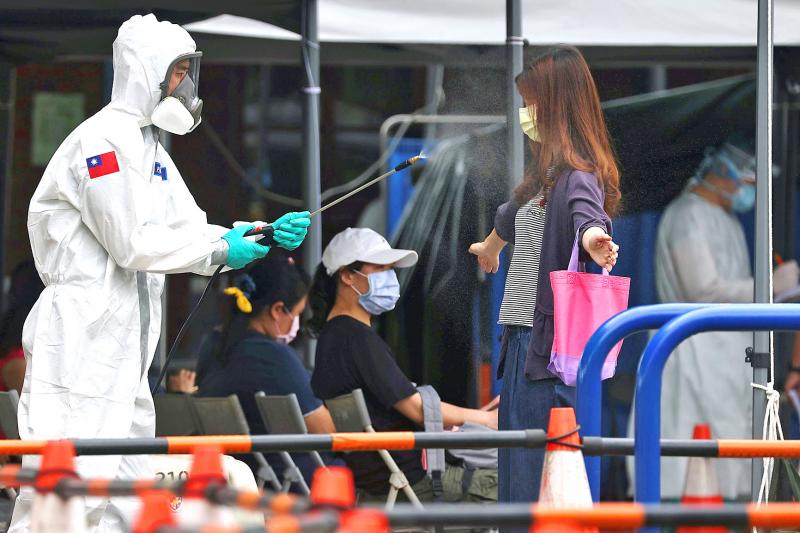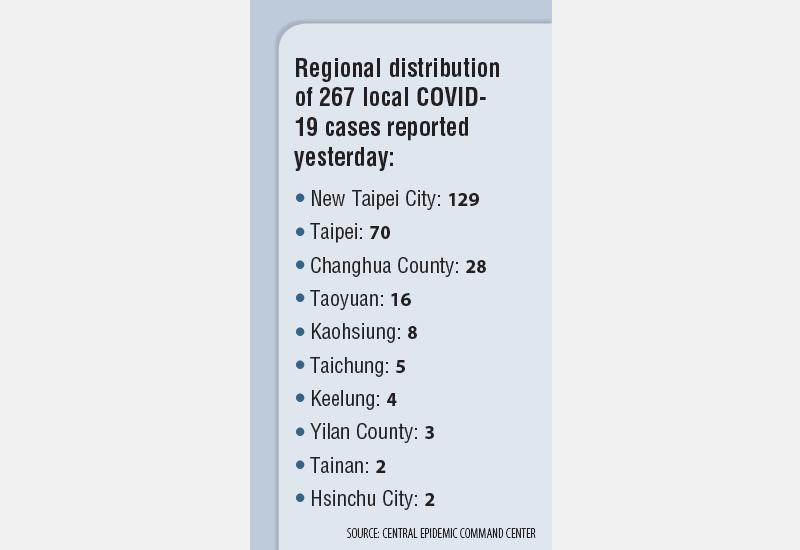The Central Epidemic Command Center (CECC) yesterday raised the COVID-19 warning to level 3 for the whole nation until Friday next week as it also reported 267 newly confirmed local infections.
The center also announced that a batch of 414,000 doses of the AstraZeneca COVID-19 vaccine, the second batch from the COVAX global vaccine-sharing program, was to arrive in Taiwan yesterday afternoon.
There were 275 newly confirmed cases of COVID-19 — 267 local cases and eight imported ones, said Minister of Health and Welfare Chen Shih-chung (陳時中), who heads the center.

Photo: Ann Wang, Reuters
New Taipei City had the most locally transmitted cases at 129, followed by Taipei with 70, Changhua County with 28, Taoyuan with 16, Kaohsiung with eight, Taichung with five, Keelung with four, Yilan County with three, and Tainan and Hsinchu City with two each, he said.
CECC data showed that 87 of those infected had recently visited Taipei’s Wanhua District (萬華), 73 were part of a cluster linked to Wanhua’s teahouses, 31 were part of three previously reported clusters, 49 have not yet been linked to a known cluster and 27 were under contact tracing.
Although most of those newly infected live in Taipei and New Taipei City, more infections are being reported in other cities and counties, expanding to more than half of the nation, with Tainan being the latest addition, Chen said.

“The center announces that from today [Wednesday], the COVID-19 warning is raised to level 3 for the whole nation,” he said. “The disease prevention regulations will be the same for everyone and observed through the nation.”
Chen said that the level 3 enhanced measures for the nation are the same as those for Taipei and New Taipei City, which were announced on Saturday last week, adding that “raising the warning to level 4 is unnecessary at this time.”
The enhanced measures stipulate that people wear masks when not at home; avoid unnecessary travel, activities and gatherings; and limit social gatherings to a maximum of five people indoors and 10 people outdoors — this does not apply to workplaces, schools or family members living in the same household.
The disease prevention policies implemented by the central and local governments should match the CECC’s regulations and guidelines, Chen said, adding that the center would coordinate with local governments and assist them if they lacked resources or personnel.
“A national disease prevention meeting of CECC personnel and top local government officials will be held daily to integrate resources, examine our progress on policy implementation and dispel false information,” Chen said.
A news conference would follow the meeting each day, he said.
The center would collate and map the outbreak’s footprint — based on the locations visited by those infected — to identify virus hotspots across the nation, he said, adding that local governments would set up testing stations at the hotspots.
Local governments would receive a set of standardized procedures for assigning newly infected people to a centralized quarantine facility or hospitalizing them, Chen said.
Local governments have been instructed to expand the capacity of quarantine hotels, he added.
Regarding the 414,000 AstraZeneca doses expected to arrive yesterday afternoon, Chen said: “Due to rapid changes in the nation’s COVID-19 situation, we will reserve a percentage of the doses for frontline healthcare professionals and disease prevention personnel.”
Frontline workers include all those who have a high risk of exposure, such as testing personnel, people who transport COVID-19 patients, and those employed at centralized quarantine facilities and quarantine hotels, Chen said.
The Food and Drug Administration would run quality control tests on the new batch of vaccines, a process expected to take at least a week, Chen said, adding that the center would meanwhile develop a mechanism for allocating the does going to frontline workers.
The new batch is set to expire on Aug. 31, said Centers for Disease Control Director-General Chou Jih-haw (周志浩), who heads the CECC’s disease surveillance division.

CHAOS: Iranians took to the streets playing celebratory music after reports of Khamenei’s death on Saturday, while mourners also gathered in Tehran yesterday Iranian Supreme Leader Ayatollah Ali Khamenei was killed in a major attack on Iran launched by Israel and the US, throwing the future of the Islamic republic into doubt and raising the risk of regional instability. Iranian state television and the state-run IRNA news agency announced the 86-year-old’s death early yesterday. US President Donald Trump said it gave Iranians their “greatest chance” to “take back” their country. The announcements came after a joint US and Israeli aerial bombardment that targeted Iranian military and governmental sites. Trump said the “heavy and pinpoint bombing” would continue through the week or as long

TRUST: The KMT said it respected the US’ timing and considerations, and hoped it would continue to honor its commitments to helping Taiwan bolster its defenses and deterrence US President Donald Trump is delaying a multibillion-dollar arms sale to Taiwan to ensure his visit to Beijing is successful, a New York Times report said. The weapons sales package has stalled in the US Department of State, the report said, citing US officials it did not identify. The White House has told agencies not to push forward ahead of Trump’s meeting with Chinese President Xi Jinping (習近平), it said. The two last month held a phone call to discuss trade and geopolitical flashpoints ahead of the summit. Xi raised the Taiwan issue and urged the US to handle arms sales to

BIG SPENDERS: Foreign investors bought the most Taiwan equities since 2005, signaling confidence that an AI boom would continue to benefit chipmakers Taiwan Semiconductor Manufacturing Co’s (TSMC, 台積電) market capitalization swelled to US$2 trillion for the first time following a 4.25 percent rally in its American depositary receipts (ADR) overnight, putting the world’s biggest contract chipmaker sixth on the list of the world’s biggest companies by market capitalization, just behind Amazon.com Inc. The site CompaniesMarketcap.com ranked TSMC ahead of Saudi Aramco and Meta Platforms Inc. The Taiwanese company’s ADRs on Tuesday surged to US$385.75 on the New York Stock Exchange, as strong demand for artificial intelligence (AI) applications led to chip supply constraints and boost revenue growth to record-breaking levels. Each TSMC ADR represents

State-run CPC Corp, Taiwan (CPC, 台灣中油) yesterday said that it had confirmed on Saturday night with its liquefied natural gas (LNG) and crude oil suppliers that shipments are proceeding as scheduled and that domestic supplies remain unaffected. The CPC yesterday announced the gasoline and diesel prices will rise by NT$0.2 and NT$0.4 per liter, respectively, starting Monday, citing Middle East tensions and blizzards in the eastern United States. CPC also iterated it has been reducing the proportion of crude oil imports from the Middle East and diversifying its supply sources in the past few years in response to geopolitical risks, expanding